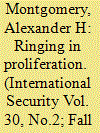|
|
|
Sort Order |
|
|
|
Items / Page
|
|
|
|
|
|
|
| Srl | Item |
| 1 |
ID:
181550


|
|
|
|
|
| Summary/Abstract |
What affects Americans’ sensitivity to international laws and norms on the use of force? A wealth of recent IR literature tackles this question through experimental surveys using fictional scenarios and treatments to explore precisely when Americans would approve of government policies that would violate the laws of war. We test whether such survey experiments may themselves be affecting public sensitivity to these norms—or even Americans’ understanding of the content of the norms themselves. We show that being invited to express a preference regarding war crimes in survey settings has a negative impact on Americans’ understanding of US legal and ethical obligations in war and that reporting previous findings can inflate support for war crimes. We conclude with suggestions for future experimental survey design in international relations and international law.
|
|
|
|
|
|
|
|
|
|
|
|
|
|
|
|
| 2 |
ID:
131511


|
|
|
|
|
| Publication |
2014.
|
| Summary/Abstract |
Through a series of focus groups with human security practitioners, we examined how powerful organizations at the center of advocacy networks select issues for attention. Participants emphasized five sets of factors: entrepreneur attributes, adopter attributes, the broader political context, issue attributes, and intranetwork relations. However, the last two were much more consistently invoked by practitioners in their evaluations of specific candidate issues. Scholars of global agenda setting should pay particular attention to how intranetwork relations structure gatekeeper preferences within transnational advocacy spaces because these help constitute perceptions of issues' and actors' attributes in networks.
|
|
|
|
|
|
|
|
|
|
|
|
|
|
|
|
| 3 |
ID:
131604


|
|
|
|
|
| Publication |
2014.
|
| Summary/Abstract |
Various policy options have been proposed for slowing or halting the spread of nuclear weapons, yet all rely on sound intelligence about the progress of nuclear aspirants. Historically, the United States' record of estimating foreign weapons programs has been uneven, overestimating the progress made by some proliferators while underestimating others. This paper seeks to catalogue and evaluate the intelligence work surrounding 16 of the 25 states that are thought to have pursued nuclear weapons and to provide a framework for evaluating the causes of distorted intelligence estimates of nuclear proliferation. In particular, we identify 12 specific hypotheses related to politics, culture, bureaucracy and organizational culture, then explore how they play out in practice through two case studies (North Korea and Israel). We find that the US has overestimated nuclear programs much more frequently than it has underestimated or correctly estimated them.
|
|
|
|
|
|
|
|
|
|
|
|
|
|
|
|
| 4 |
ID:
090613


|
|
|
| 5 |
ID:
080977


|
|
|
|
|
| Publication |
2008.
|
| Summary/Abstract |
Does the dramatic rise of the number of preferential trade agreements (PTAs) worldwide make economic sanctions more likely through increasing the leverage of the powerful and pitting states against each other in competition (power) or less likely through increasing the benefits of trade, resolving disputes, and promoting like-minded communities (plenty)? The authors offer the first systematic test of these propositions, testing hypotheses on sanctions onset using a data set of episodes from 1947 through 2000. In favor of the plenty argument, increases in bilateral trade do decrease sanctioning behavior; in favor of the power argument, an increase in the potential sanctioner's GDP or centrality in the network of all PTAs make sanctioning much more likely. However, mutual membership in PTAs has no direct effect on the propensity of states to sanction each other
|
|
|
|
|
|
|
|
|
|
|
|
|
|
|
|
| 6 |
ID:
068731


|
|
|
| 7 |
ID:
067212


|
|
|
| 8 |
ID:
175080


|
|
|
|
|
| Summary/Abstract |
In “Hiroshima in Iran: What Americans Really Think about Using Nuclear Weapons and Killing Noncombatants,” a pathbreaking survey of attitudes toward the laws of war published in the summer 2017 issue of International Security, Scott Sagan and Benjamin Valentino found that Americans are relatively insensitive to the targeting of civilian populations and to international norms and taboos against the use of nuclear weapons. We replicated a key question of this study, where respondents were asked if they would support saturation bombing an Iranian city to end a war. We also introduced some variations into the experiment to directly measure any potential influence of international norms and laws. Overall, our quantitative and qualitative findings are more optimistic than those of Sagan and Valentino's study: Americans do strongly believe it is wrong to target civilians. And in a real-life scenario such as this, a majority would likely oppose such a bombing. These findings suggest, however, that much depends on how survey questions are structured in measuring those preferences and whether legal or ethical considerations are part of any national conversation about war policy.
|
|
|
|
|
|
|
|
|
|
|
|
|
|
|
|
|
|
|
|
|